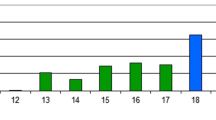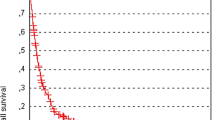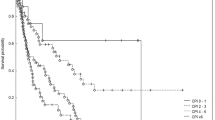Purpose:
To create a scoring system to estimate survival of patients who received whole-brain radiotherapy (WBRT) for brain metastases.
Material and Methods:
Based on a multivariate analysis of 1,085 retrospectively analyzed patients, a scoring system was developed. This score was based on the four significant prognostic factors found in the multivariate analysis including: age, performance status, extracranial metastases at the time of WBRT, and interval between tumor diagnosis and WBRT. The score for each prognostic factor was determined by dividing the 6-month survival rate (in %) by 10. The total score represented the sum of the partial scores for each prognostic factor. Total scores ranged from 9 to 18 points, and patients were divided into four groups. For each group, survival was compared for short-course (5 × 4 Gy) versus longer-course WBRT (10 × 3 Gy/20 × 2 Gy).
Results:
Actuarial 6-month survival rates were 6% for patients with scores of 9–10 points, 15% for those with scores of 11–13 points, 43% for those with scores of 14–16 points, and 76% for those with scores of 17–18 points (p < 0.001). Longer-course WBRT was not associated with better survival than short-course WBRT in any of the four groups.
Conclusion:
: Patients with brain metastases receiving WBRT can be grouped with this score to estimate survival. Short-course and longer-course WBRT resulted in similar survival in all groups studied. However, in the more favorable patients with scores of 17–18, longer-course WBRT with lower doses per fraction should be considered, as these schedules have been associated with less neurocognitive toxicity.
Ziel:
Entwicklung eines Scores zur Abschatzung der Uberlebensprognose von Patienten mit Hirnmetastasen, die eine Ganzhirnbestrahlung (WBRT) erhielten.
Material und Methodik:
Basierend auf einer Multivarianzanalyse von 1 085 retrospektiv analysierten Patienten wurde ein Score entwickelt. Dieser Score berucksichtigte die vier Prognosefaktoren, die in der Multivarianzanalyse signifikant waren: Alter, Allgemeinzustand, extrakranielle Metastasen zur Zeit der WBRT und Intervall von der Erstdiagnose der Tumorerkrankung bis zur WBRT. Den Score fur jeden einzelnen Prognosefaktor erhielt man, indem man die Uberlebensrate nach 6 Monaten (in %) durch 10 dividierte und auf ganze Zahlen rundete (Tabelle 1). Der Gesamtscore entsprach der Summe der vier Teilscores und betrug zwischen 9 und 18 Punkten (Abbildung 1). Nach dem Score wurden vier Gruppen gebildet. In jeder Gruppe wurden Kurzzeit-WBRT (5 × 4 Gy) und Langzeit-WBRT (10 × 3 Gy/20 × 2 Gy) fur das Uberleben verglichen.
Ergebnisse:
Die aktuarischen Uberlebensraten nach 6 Monaten betrugen 6% bei Patienten mit einem Score von 9–10 Punkten, 15% bei einem Score von 11–13 Punkten, 43% bei einem Score von 14–16 Punkten und 76% bei einem Score von 17–18 Punkten (p < 0,001; Abbildung 2). Die Langzeit-WBRT fuhrte in keiner Gruppe zu einem besseren Uberleben als die Kurzzeit-WBRT (Abbildung 3).
Schlussfolgerung:
Bei Patienten mit Hirnmetastasen, die eine WBRT erhalten, kann mit Hilfe dieses Scores die Uberlebensprognose abgeschatzt werden. Langzeit- und Kurzzeit-WBRT fuhrten zu vergleichbaren Uberlebensraten. Bei Patienten mit einem Score von 17–18 Punkten sollte die Langzeit-WBRT mit geringeren Dosen pro Fraktion erortert werden, da diese Schemata nach der Literatur seltener mit neurokognitiven Defiziten einhergehen.
Similar content being viewed by others
Author information
Authors and Affiliations
Corresponding author
Rights and permissions
About this article
Cite this article
Rades, D., Dunst, J. & Schild, S.E. A New Scoring System to Predicting the Survival of Patients Treated with Whole-Brain Radiotherapy for Brain Metastases. Strahlenther Onkol 184, 251–255 (2008). https://doi.org/10.1007/s00066-008-1831-5
Received:
Accepted:
Issue Date:
DOI: https://doi.org/10.1007/s00066-008-1831-5




